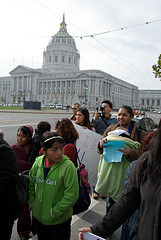Question by snapbail: How do I begin a household budget?
Suggestions for the steps on planning a household budget. THANKS.
Best answer:
Answer by oracleofohio
For 1 month, keep track of every penny you spend. Bills, food, expenses. After that month, sit down and plot out where all of your money goes and make a household budget based on that. When you have all of the numbers in front of you it’s easier to see where you can cut back and save money. Good luck 🙂
Add your own answer in the comments!


Write down all the money you get. Now, track your expenses just like suggested before, but also set aside money for irregular expenses like car repairs, appliance purchases, vacation, property tax, replacing clothing, etc. Try to put at least 5% of your earnings into a savings account before doing anything else. The biggest part is to be brutally honest, and plan for what you are going to spend. I budget $ 40 a month for my nails, because I know I’m going to spend it. Some people don’t account for that sort of thing. If you like to go out to dinner, put money in an envelope for dining out, and when that money is gone for the month, stop! Stop using credit cards for a month or two, see how much you really are spending over and above your salary.
I’ve been using this site – http://www.daddymorebucks.com
The author has a bunch of kids and lives on a budget. The site routinely talks about being a “frugal yuppie” lol.
He has some real creative ideas on gas/food/electric bills.
It’s helped us save over $ 500 a month.
A budget is a written plan for spending and/or saving your money. A balanced budget will have the same amount at the totals of income and expenses. Anything over or under your income is not balanced even if you put extra money into a category for savings. You will have fixed expenses and variable expenses and you’ll surely have quarterly or emergency expenses that need to be addressed. Look at your budget in order of priorities… housing first, utilities next, transportation next, any expenses for children or pets, and then go down the list of where you spend your money. Be realistic. Using figures to make the budget balance aren’t doing you any good. You can always expect something to blow the budget like car troubles, broken appliances, medical bills, etc. Prepare for them. Make sure to have expense categories for savings and do not spend that money on anything but emergencies. Ideally you would like to have a 3-6 month cushion of expenses in savings even if that means cutting back or cutting out on things you don’t really need. Remember… needs are more important than wants. If your budget is out of whack, consider ways to increase income and consider ways to decrease expenses. You have priorities. Make sure your budget reflects the priorities. You can never afford everything that you want in life so start with needs and then remember that debt should not be in your budget but savings should be.